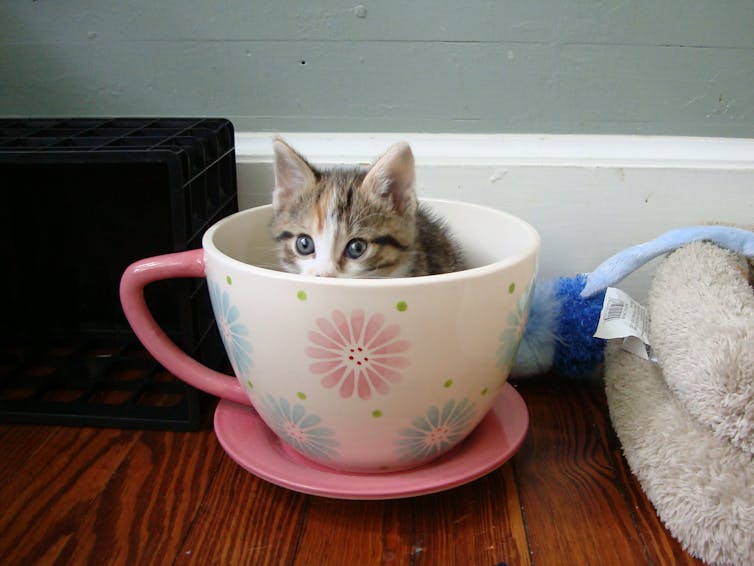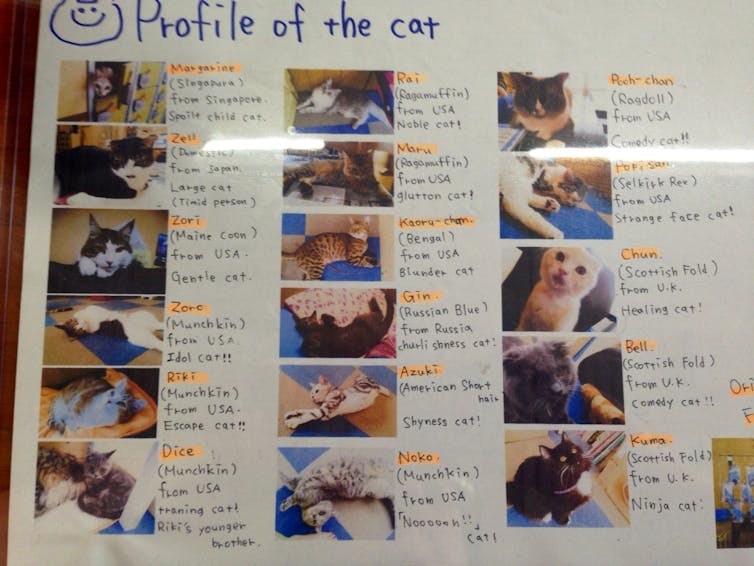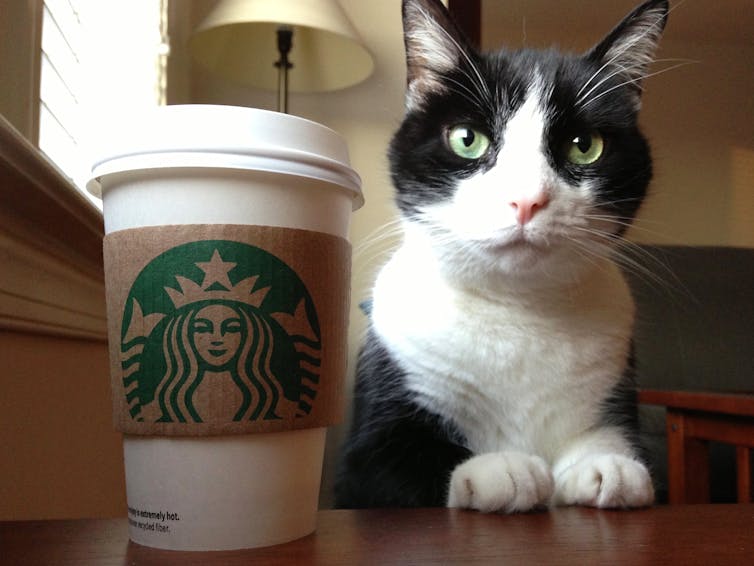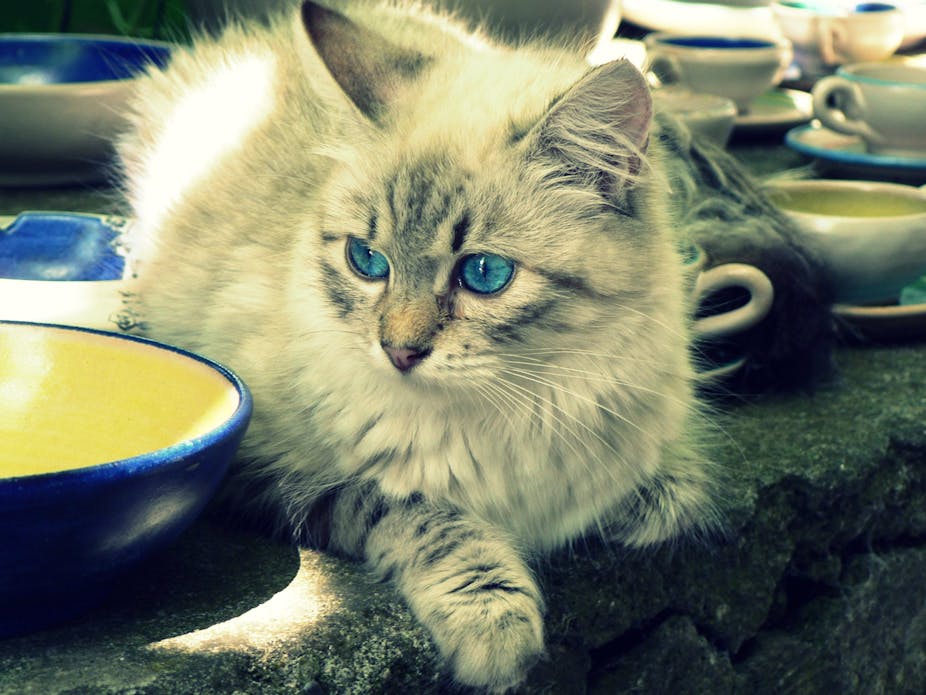Australia’s first cat café is set to open in Melbourne next month. Based in Queen Street, the cat café’s owners were inspired after visiting a cat café in Japan. Though the phenomena began in Taiwan in the late 1980s, cat cafés are popularly associated with the urban megapolises of Tokyo and Osaka. I recently visited such a café in Osaka, making me reflect on why such spaces are popular in big cities.
Personally, I only like animals at a distance. I like looking at tumblr posts of cute animals. I have never liked pets, but I was curious about cat cafés after reading Anne Allison’s recent book Precarious Japan, in which she discusses the ongoing recession in Japan and the precarity of many of the country’s young workers.
Gone are the days of a secure “salaryman” company job for life with more and more young people (including university graduates) struggling to find work and unable to afford to move out of the family home.
Concomitant with such precarity is a declining birthrate – due partly, according to Allison, to the wariness of young people to commit to relationships without secure employment. Japan’s younger generation has a significant amount of single “freeters” (free workers) in casual, un- and semi-skilled professions.

Nevertheless the financial juggernaut of Japan continues – new commodities enrapture the population as “torendii” (trendy) signifiers of coolness and the nation continues to be one of the largest consumer markets in the world. Alongside myriad cute toys, electronic gadgets and manga comics, the Japanese have become adept at the “experiential commodity”: turning experiences, once ostensibly outside the market, into an exchangeable “experience”.
The cat café is one such experiential commodity. Though you receive a drink and cake when you visit a cat café, visitors are really purchasing the experience of being in the presence of kitties. Allison posits that cat cafés operate as sites for the experience of intimacy that many young Japanese single freeters lack.
In particular, she notes that, in the café she visited, there are mostly female customers. In Japan, hostess bars and brothels abound – and though there are “host” clubs for women, they are considered rather tasteless. A cat café provides a space for the experience of intimacy without the obligations of a human-to-human relationship.
Further, such spaces – often visited in lunch hours – offer a relatively tranquil site away from the busyness of contemporary Japanese cities.

The cat café I visited was in Dotonbori, the popular “eating street” in downtown Osaka. It was on the fifth floor of a building housing traditional Chinese medicine practitioners, izakaya (pubs) and okonomiyaki restaurants.
Certainly, the café offered a tranquil respite from the touts and spruiking encountered at street level. The walls leading up to the entrance were covered in cute Polaroids of cats and, once inside, I was given a profile of all the kitties the café houses and a small container of shredded chicken to feed the residents. I ordered a pineapple juice and sat down.
Being averse to both meat and cats, I left the container open on the floor and waited for the kittens to come to me. Chun was the first to head over. He is actually described in his profile as “Healing cat!”. My neuroses only allowed a quick pat. But the young woman – dressed in “OL” (office lady) clothing – was more keen, and petted Chun while sipping a cocoa.
I looked around the “play” area for the cats – most of whom were sleeping – and took some photos and videos. The café’s soundtrack was jazz muzak interspersed with purring and meowing. The customers did not speak to one another. They focused solely on their new feline friends. I left feeling ambivalent (and reaching for my hand sanitiser).
The English writer John Berger reminds us that “pets” are a relatively recent category. He wrote in the 1970s that animals offer humans an odd kind of companionship. They “enjoy a kind of innocence … emptied of experience and secrets” in the eyes of humans, provoking nostalgia when encountered.

Of course, Berger’s point is that the way we think of animals, particularly domesticated ones, is a projection of how we see ourselves.
So, when the Melbourne cat café website proclaims that interaction with kitties can lower “high blood pressure, stress and anxiety” we can think about the cat café as culturally significant and resonant in a time when such medical problems are increasing due particularly to the labour relations of late capitalism.
With work becoming increasingly casualised, precarious and scarce in Australia – like in Japan ten years before – it is little wonder that the Melbourne cat café has already generated 14,000 “likes” on Facebook.
Rosemary will be on hand for an Author Q&A session between 11am and 1pm tomorrow (June 12). Post any questions about cat cafés and experiential commodities in the comments section below.

